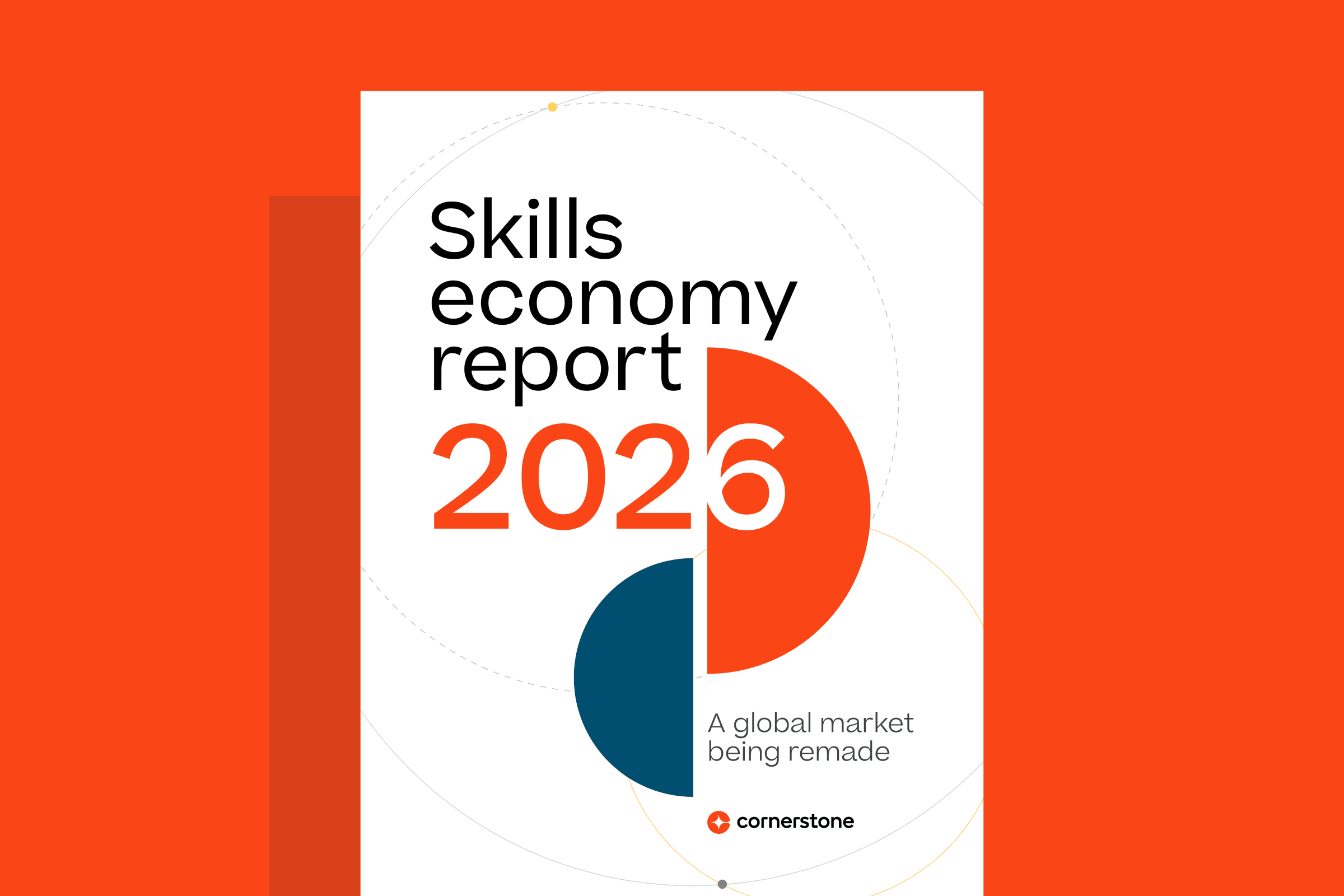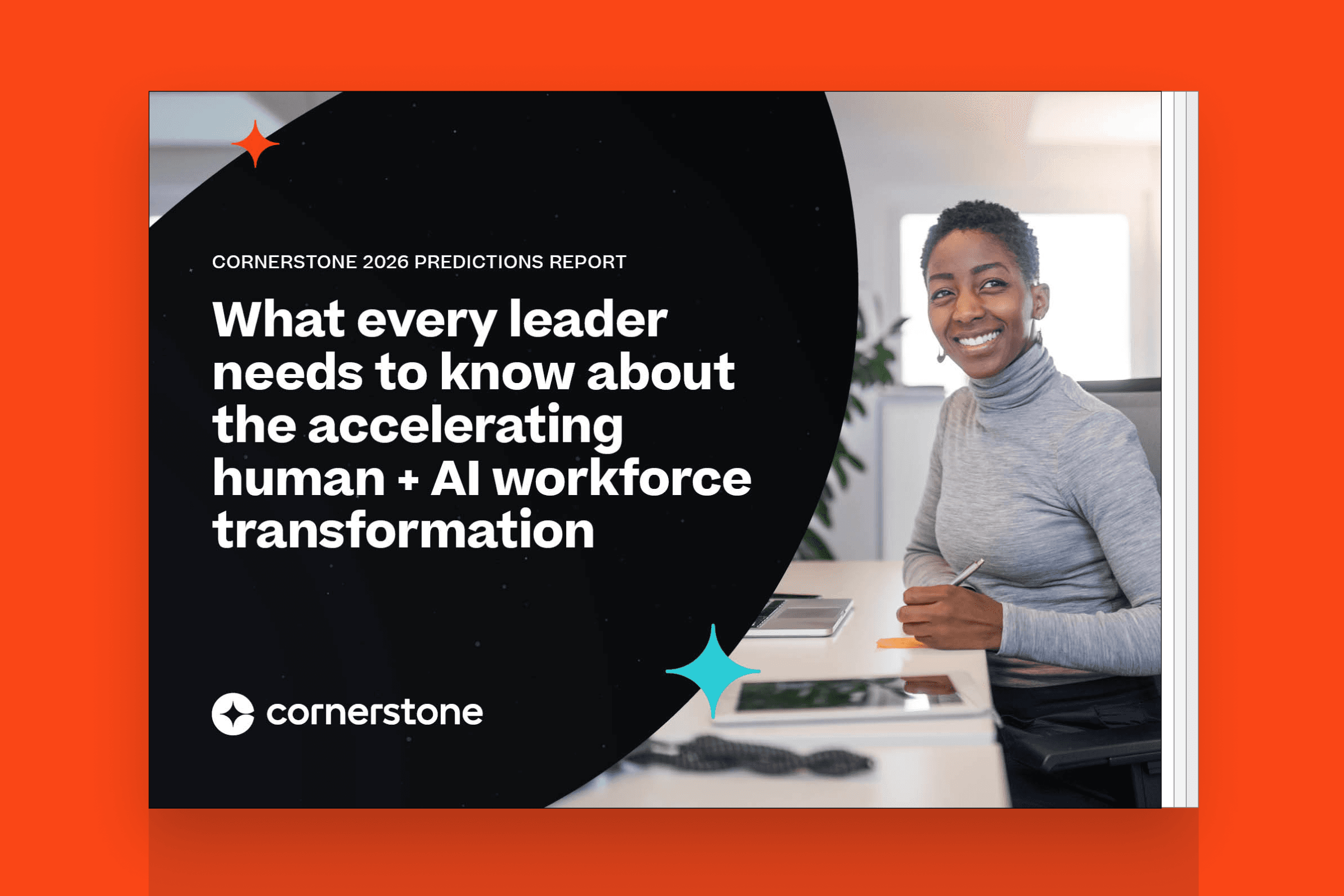Key Takeaways:
- Skills Ontology Basics: Discover how skills ontologies leverage AI to create dynamic databases that capture skill relationships and empower organizations in making informed talent decisions.
- Complete Skilling Strategy: AI-powered skills ontologies enable benchmarking, assessing skill proficiency, addressing skill gaps, and providing personalized learning experiences for employees.
- Real-world Impact: In healthcare, skills ontology technology has broadened talent attraction by identifying transferrable skills, reducing hiring time, and informing learning decisions to close skills gaps.
Nathaniel Plamondon — Senior Product Marketing Manager, Cornerstone
The days of asking employees to self-select their capabilities from a list of thousands of unorganized skills to build a rudimentary database are over. Artificial intelligence (AI) is here to help build sophisticated skills ontologies that better inform talent decisions for organizations. What previously took thousands of hours and sometimes millions of dollars to roll out can now be achieved quickly, at scale.
Sometimes people are hesitant to let technology take over. But it can deal with the data more efficiently than humans and help us make smarter decisions. Here are some basics about skills ontologies and what they can help organizations accomplish.
What is a skills ontology?
First, I find it helpful to start with what a skills ontology is not. Many skills systems rely on a simple skills database, which is not much more than a list of terms that may have associated definitions. These provide a minimal level of functionality. There are also skills taxonomies, which add hierarchical relationships between skills to the mix. Here, we begin to understand the relationships between different skills, but only within rigid skill concepts.
Then, there is an ontology, which is a “set of concepts and categories in a subject area or domain that shows their properties and the relations between them." So, at its most basic level, a skills ontology is a set of unique skills with defined connections — or relationships — to other skills or entities like job roles. Unlike skills databases or skills taxonomies, skills ontologies enable a fluid and dynamic database of skills and create a context for how skills are related to each other, even across vastly different subject matter areas. For example, where a taxonomy can understand how a variety of sales skills relate to one another because they exist within the same hierarchy of sales skills, it cannot understand how these sales skills relate to marketing skills, administrative skills, or skills from other domains.
Technology is a key component for creating an accurate skills ontology. Software uses AI to make it “easier for HR leaders to create a more accurate, real-time inventory of workforce skills,” according to SHRM. These technology tools “deconstruct jobs” into their distinct skills and capabilities “by automatically identifying, categorizing, and assessing employee skills in a company.”
This is becoming increasingly important in organizations as research from ManpowerGroup found that 7 in 10 employers struggle to find workers with the right skills. It’s just as important to employees as research from Gallup found that 48% of workers consider switching jobs to update their skills.
How skills ontologies help build a complete skilling strategy
Skills ontologies — and the AI-powered software that makes them possible — help to build a complete skills strategy with the following impact:
Benchmark and assess: They create and report on AI-driven skills profiles, bolstered by self and peer assessments that capture skill proficiency, interest, and enjoyment.
Close skill gaps: They can programmatically deliver learning (or training) to address organizational skill gaps and meet immediate performance expectations.
Empower development and growth: They deliver a personalized, social, and self-driven learning experience to support longer-term career paths, interests, and goals.
Enable strategic deployment: They enable HR leaders and managers to put the right skills to work by accounting for goals, roles, projects, gigs, and providing personalized learning and development opportunities.
Scaling skilling strategies and other benefits
AI-powered skills ontologies help to scale skilling programs because they remove much of the administrative burden of building and maintaining high-quality skills data. What were previously rudimentary skills taxonomies built manually by admin and employee input and maintenance, have now turned into configurable skills ontologies based on big data. Technology automates the work and pull in global datasets at speed and scale, putting organizational skills data in context with the world’s information.
But a skills ontology is of no use on its own — integrating it into talent solutions like an LMS or performance management system is when it really comes to life. Putting skills front and center empowers managers, leaders, and individuals to take an interest in their own skills, instead of relying on learning and development leaders to guide their career progression.
Actioning insights discovered from these skills ontologies can close skills gaps — in organizations and the marketplace. This information can power learning recommendations and bring the skills conversation into performance reviews. Using skills ontologies to inform learning and development can help organizations attract and retain a higher quality of talent, as well as enable talent mobility within an organization to drive business innovation and growth.
Real-world example of how skills ontologies impact hiring
In healthcare, skills ontology technology has helped widen an organization’s reach when it comes to talent attraction. Candidates might be ER nurses, emergency department nurses, ICU registered nurses and about 40 other titles, but they often have similar skills that are transferrable to different nursing positions. The titles are adjacent, but the skills are related.
AI-powered software has replaced what used to take consultants thousands of hours and millions of dollars to build. And the result is even better, ever-evolving, and more intelligent as it continues to collect information. Organizations and employees both benefit from skills ontologies as it provides actionable data that informs learning decisions and closes skills gaps. In addition, skills ontologies help hiring managers ID new candidates they may have overlooked in the past.
If you’re interested in learning more about how skills ontologies power skilling strategies and turbocharge learning programs, you can find information here.
Get in touch with one of our experts to explore how we can tailor our solutions to your organization's needs.


